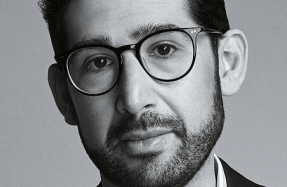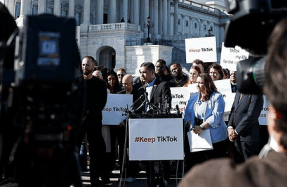The overt operative

The accused Kremlin agent was not hard to find. It took only a few days of pestering him for a meeting in early April before his answer arrived via encrypted message, beneath a profile picture of a lion showing its fangs. “I tried very hard and found an opportunity,” Andriy Derkach wrote to me in Russian, adding politely, “if it is convenient for you.”
We set a time in Kyiv the next day, but he declined to send an address. Instead, he dispatched one of his bodyguards to pick me up in a black van and drive in circles for a while, weaving through the gridlock of the Ukrainian capital, before handing me off to two more bodyguards in the back of a luxury apartment tower.
Through a side door and up a few flights of stairs was a space that could have housed a startup in Brooklyn or Silicon Valley: exposed brick painted in a shade of avocado, glass partitions, a foosball table, a black cat that eyed me from its nook in the waiting room. Only a few of the details aligned with my host’s reputation. There were Orthodox icons crowding the shelves, and invisible speakers played a sound that barely registered, like the distant chatter of a crowd, designed to jam unwanted listening devices. As we sat down in a conference room, Derkach urged me to tape our conversation. “I’m already recording,” he noted flatly, though it wasn’t clear why or with what.
In the world of espionage, it’s rare to come across a spy with an office, a website and a story to tell. It happens now and then, usually when the spy has retired and written a memoir. But active intelligence operatives, especially those with ties to Moscow, do not tend to speak on the record while pursuing their mission in the field. That’s partly what makes Andriy Derkach so perplexing.
The U.S. government—under both Joe Biden and Donald Trump—has called Derkach an “active Russian agent.” About a month before our meeting in Kyiv, the Office of the Director of National Intelligence, which oversees all U.S. spy agencies, accused him of being a Kremlin operative par excellence, the tip of the spear in a Russian plot to sway the 2020 presidential election. In a declassified report, it said with “high confidence”—the gold standard for such conclusions—that Russian President Vladimir Putin had authorized and “probably directed” the plot to help Trump win a second term. As part of this operation, the report concluded, “Putin had purview over the activities of Andriy Derkach.”
Derkach’s efforts differed from Russia’s more infamous round of election interference. During the 2016 presidential race, Russian military hackers stole and leaked emails from Hillary Clinton’s campaign, hiding their work behind proxy servers and fake identities. Derkach, a seven-term member of the Ukrainian parliament, worked in plain sight, often publicizing his efforts in the press as they unfolded.
In the fall of 2019, he gained access to Trump’s inner circle through Rudy Giuliani, the President’s personal lawyer. He then provided Giuliani with documents purporting to show that Joe Biden and his family were involved in corruption. After their first meeting, Derkach even posted a photo of himself with Giuliani on Facebook, mugging for the camera as they exchanged a stack of documents. In the months before Election Day, he released a series of secret recordings of Biden pressuring top Ukrainian officials to fight corruption. The source of those tapes remains a mystery to this day.
In the present age of American division, foreign influence campaigns need not be clandestine to achieve their goals
The paradox of these maneuvers is that their brazenness helped shield Derkach: if he was a spy, his associates told
You’re reading a preview, subscribe to read more.
Start your free 30 days





